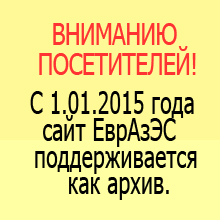|
AGREEMENT AGREEMENT on common measures for non-tariff regulation with regard to the third countries AGREEMENT on common measures for non-tariff regulation with regard to the third countries
The government of the Endeavoring to create a common customs area of the Parties’ States and to ensure favorable conditions for an efficient functioning of the customs union, Proceeding from the necessity to pursue a coordinated foreign trade policy based on the principles of non-discrimination, openness, mutual advantage and protection of national interests, Endeavouring to establish a unified procedure for importing goods from states which are not parties to this Agreement (hereinafter “third countries”) into the customs territories of the Parties’ States and into the common customs area of the Parties’ States after its creation, and for exporting goods from these territories, Taking into account the necessity to apply unified measures of non-tariff regulation with regard to third countries, Following generally recognised principles and the standards of international law, Have agreed as follows:
Article 1 Key terms
The terms used in this Agreement have the following meaning: “foreign trade activities” – activities related to transactions in the foreign trade of goods; “foreign trade of goods” – export and (or) import of goods. Transporting goods from one part of the customs territory of a Parties’ States to another part of its customs territory, provided such parts are not interconnected by a land territory, and through the customs territory of a foreign State is not considered as foreign trade of goods; “common customs area” – the territory consisting of the customs territories of the Parties’ States; “import of goods” – importation of goods into the customs territory of a Parties’ States or into the common customs area from the customs territories of third countries without obligation to re-export them; “exclusive right to export and (or) import certain kinds of goods” – the right to practice foreign commerce in certain kinds of goods, granted by a licence issued by an authorised State executive body; “quantitative limitations on export and (or) import” – measures on quantitative limitation of foreign trade of goods which can be imposed by means of establishing quotas; “license” and (or) “permit” – special documents allowing export and (or) import of goods; “licensing” – a set of administrative measures, establishing a procedure for granting licenses and (or) permits; “supervision of export and (or) import of certain kinds of goods” – a temporary measure, established with a view to monitoring the dynamics of export and (or) import of certain kinds of goods (automatic licensing); “administrative procedure” – a procedure for carrying out foreign commerce in certain kinds of goods, which implies licensing or application of other administrative measures and customs control and processing of such goods transported out of the customs territory of a Party State or the common customs area; “authorized State executive body” – an executive body of a State Party, invested with the right to issue licenses and (or) permits; “participants in foreign trade activities” – legal entities and organizations which are not legal entities registered in one of the Parties’ States and created in accordance with the law of this State, physical persons having a permanent or primary domicile on the territory of one of the Parties’ States, being citizens of this State or having a right to permanently reside there, or registered as sole traders in accordance with the law of this State; “export of goods” –
exportation of goods from the customs territory of a “non-tariff regulatory measures” – a set of measures aimed at regulating foreign trade of goods, carried out by imposing quantitative and other bans and limitations of an economic character.
Article 2 Application of unified measures of non-tariff regulation
1. As regards trade with third countries, the common customs area shall entail the application of unified non-tariff regulatory measures on the basis of the principles stipulated in the Articles 3–6 and 9 of this Agreement. 2. The procedure for introducing and applying unified non-tariff regulatory measures shall be determined by separate agreements between the Parties. Article 3 Quantitative limitations
1. Export and import of goods in the course of foreign trade with third countries shall be carried out without quantitative limitations, except for the cases stipulated in this Article. 1) bans and temporary limitations on goods export, aimed at preventing or reducing a critical shortage of foodstuffs or other goods which are essential for the domestic market; 2) limitations on the import of agricultural goods or water biological resources imported in any form, if it is necessary to: а) reduce the production or sales of comparable domestic goods; b) reduce the production or sales of domestic goods which can be directly replaced by imported goods if there is no significant production of comparable domestic goods; c) free the market from a temporary surplus of comparable domestic goods by offering this surplus to certain groups of consumers free of charge or at less than market prices; d) free the market from a temporary surplus of domestic goods which can be directly replaced by imported goods if there is no significant production of comparable domestic goods, by offering this surplus to certain groups of consumers free of charge or at less than market prices; e) limit the production of goods of animal origin, whose production depends completely or mainly on imported goods, if the production of comparable domestic goods is insignificant.
Article 4 Exclusive right to export and (or) import certain kinds of goods
1. Carrying out foreign trade activities may be limited by granting an exclusive right to export and (or) import certain kinds of goods. 2. The exclusive right to export and (or) import certain kinds of goods shall be implemented on the basis of a license. 3. Participants of foreign trade having an exclusive right to export and (or) import certain kinds of goods shall carry out transactions in export and (or) import of certain kinds of goods on the basis of non-discrimination and solely commercial considerations.
Article 5 Licensing in foreign trade of goods
1. Licensing in foreign trade of goods shall be established in the following cases: 1) introduction of temporary quantitative limitations on export and (or) import certain kinds of goods; 2) implementation of a permit procedure for export and (or) import of certain kinds of goods which can have injurious effect on the security of a State, life or health of citizens, property of physical or legal persons, State or municipal property, the environment, life or health of animals and plants; 3) granting of an exclusive right to export and (or) import certain kinds of goods; 4) carrying out international commitments. 2. Export and (or) import of certain kinds of goods in the cases stipulated in the clause 1 of this Article shall be based on a license issued by an authorized State executive body. 3. Absence of the license shall be a ground for a refusal of goods customs clearance. 4. The licensing rules
shall be determined by a separate agreement
Article 6 Supervision of export and (or) import of certain kinds of goods
Supervision of export and (or) import of certain kinds of goods shall be carried out by means of issuing permits for export and (or) import of goods, provided the following conditions are met: 1) the procedure for obtaining permits should be simplified to the maximum so as not to limit export and (or) import of goods; 2) permits shall be issued without limitations to any participants in foreign trade activities, on the basis of written applications submitted to an authorized State executive body; 3) applications for permits shall be submitted during working days before the goods customs processing; 4) the term of delivery for permits shall not exceed 3 working days after the application filing date.
Article 7 Measures affecting foreign trade of goods and imposed on the basis of national interests
1. Regulatory measures affecting foreign trade of goods can be imposed if they are: 1) necessary to maintain public morals or law and order; 2) necessary to protect life or health of citizens, the environment, life or health of animals and plants; 3) related to export and (or) import of gold or silver; 4) applied to protect cultural values and heritage; 5) necessary to prevent the depletion of irreplaceable natural resources and implemented simultaneously with a limitation of domestic production or consumption related to the use of irreplaceable natural resources; 6) linked to a limitation of export of domestic raw materials to provide sufficient quantity of such materials for the domestic manufacturing industry in periods when domestic prices for such materials are kept lower than world prices as the result of a stabilization plan implemented by the government; 7) necessary to acquire or distribute goods which are in total or local shortage; 8) necessary to implement international commitments; 9) necessary to guarantee defense and security; 10) necessary to ensure the implementation of legal acts not contravening international commitments and related to the application of the customs law, preservation of the environment, protection of intellectual property, and other legal acts. 2. Measures stipulated in clause 1 of this Article shall not be imposed if their implementation involves conscious or groundless discrimination against third countries, or a concealed limitation of foreign trade of goods.
Article 8 Specific kinds of bans and limitations of foreign trade of goods
1. Foreign trade of goods may be limited by measures necessary to ensure the Parties’ States participation in international sanctions in accordance with the United Nations Chartez, including measures ensuing from the provisions of the Articles 3 and 4 of this Agreement. 2. Measures limiting foreign trade of goods, including measures ensuing from the provisions of the Articles 3 and 4 of this Agreement, may be imposed with a view to protecting the external financial situation and maintaining a steady balance of payments.
Article 9 Application of non-tariff measures on the common customs area
1. Decisions on the application of non-tariff regulatory measures as regards importation of goods into the common customs area and (or) their exportation from this territory shall be passed by the Commission of the customs union, established by the Treaty on the Commission of the customs union, dated 6 October 2007 (hereinafter “the Commission”). 2. The authority of the Parties to pass decisions on the application of non-tariff regulatory measures, stipulated in this Agreement, may be transferred entirely or partly to the Commission by a resolution of the Parties States until the creation of the common customs area of the Parties States. In this case, the Commission’s decisions on the application of non-tariff regulatory measures shall be implemented by the Parties as regards importation of goods into the customs territories of their States and (or) their exportation from these territories. The Party imposing non-tariff regulatory measures in accordance with this clause shall submit the issue of the application of analogous measures by the other Parties for the Commission’s consideration and inform these Parties of the imposition and application of such measures. 4. The Parties not applying measures stipulated in clause 3 of this Article shall make efforts necessary to prevent importation of goods from third countries into the customs territory of the State of the Party imposing these measures, or exportation of goods to third countries in contravention of the above measures. 5. If, in accordance with the clause 3 of this Article, a Party imposes non-tariff regulatory measures by way of a ban or limitation on domestic goods exportation to third countries, the other Parties not applying the above measures shall not allow exportation of these goods without a licence and (or) permit issued by an authorised State executive body of this Party. 6. The Party applying non-tariff regulatory measures in accordance with the clause 3 of this Article shall make efforts necessary to ensure the implementation of clauses 4 and 5 of this Article by the other Parties and shall, inter alia, provide them with information on the goods suppliers and identification characteristics, the means of the goods transportation known to it and other information making it possible to recognise the goods which are subject to non-tariff regulatory measures. 7. Licences and (or) permits issued by an authorised State executive body of any of the Parties State after the transfer of authority to the Commission, stipulated in clause 2 of this Article, shall be recognised by all other Parties States and equally operate in all Parties States . 8. The procedure for carrying out measures applying to the common customs area, affecting foreign trade of goods and imposed for national interests (Article 7), and specific kinds of bans and limitations of foreign trade of goods (Article 8), including the cases of their unilateral imposition, and the procedure for application of other bans and limitations of foreign trade shall be determined by separate agreements.
Article 10 Exceptions
This Agreement shall not apply to the relations of the Parties concerning issues of export control, technical regulation, application of sanitary, veterinary and phytosanitary requirements and measures, or to specific protective, anti-dumping and compensatory measures.
Article 11 Adjudication of disputes
Disputes arising in connection with the implementation or interpretation of the provisions of this Agreement shall be settled by means of mutual consultations and negotiations between the Parties and, in the case of failure to achieve an agreement, shall be submitted for adjudication to the Court of Justice of the Community. Article 12 Amendments
Upon agreement between the Parties, this Agreement may be subject to amendments which shall be formalised by separate protocols. Article 13 Final provisions
The procedure for entry into force of this Agreement, acceding thereto and withdrawing therefrom shall be laid down by the Protocol on the procedure for entry into force of international treaties aimed at the establishment of the contractual and legal framework of the customs union, and accession to them and withdrawal from them, dated 6 October 2007.
Done in the city of The original of this Agreement shall be deposited with the Integration Committee of the Eurasian Economic Community, which, as the depositary for this Agreement, shall send legal copies to each Party.
For the government of the For the government of the For the government of the
|
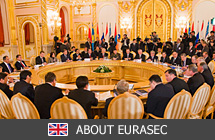

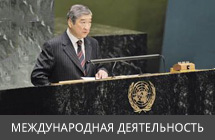
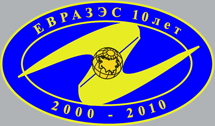
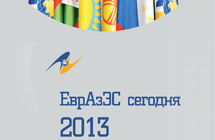
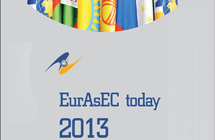
Поиск 10.10.2014 Заседание Межгосударственного совета ЕврАзЭС07.10.2014 Мультимедийная пресс-конференция в агентстве «Россия сегодня»03.10.2014 Встреча с Послом Финляндской Республики04.08.2014 Встреча Генерального секретаря ЕврАзЭС с Послом Республики Таджикистан20.06.2014 Премии Петербургского международного юридического форума «За вклад в развитие правовой интеграции на евразийском пространстве»28.05.2014 Договор о Евразийском экономическом союзе – важнейшее событие в новейшей истории наших стран25.05.2014 Презентация книги «Евразийский проект Нурсултана Назарбаева, воплощенный в жизнь. К 20-летию евразийского проекта 1994–2014»24.05.2014 VII АСТАНИНСКИЙ ЭКОНОМИЧЕСКИЙ ФОРУМ. Панельная сессия «Евразийской экономической интеграции – 20 лет. Итоги и перспективы»24.05.2014 VII Астанинский экономический форум и II Всемирная Антикризисная конференция, 21-23 мая 2014 года, Астана24.05.2014 Петербургский международный экономический форум, 23 – 24 мая 2014 года, Санкт-Петербург |

Евразийское экономическое сообщество
ЕврАзЭС
-
Страны участники
 Беларусь
Беларусь
-
 Казахстан
Казахстан
-
 Кыргызстан
Кыргызстан
-
 Россия
Россия
-
 Таджикистан
Таджикистан
-
 Узбекистан
Узбекистан
-
 Молдова
Молдова
-
 Украина
Украина



